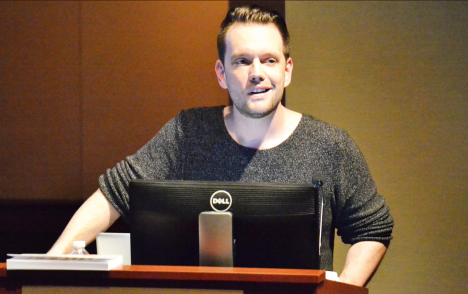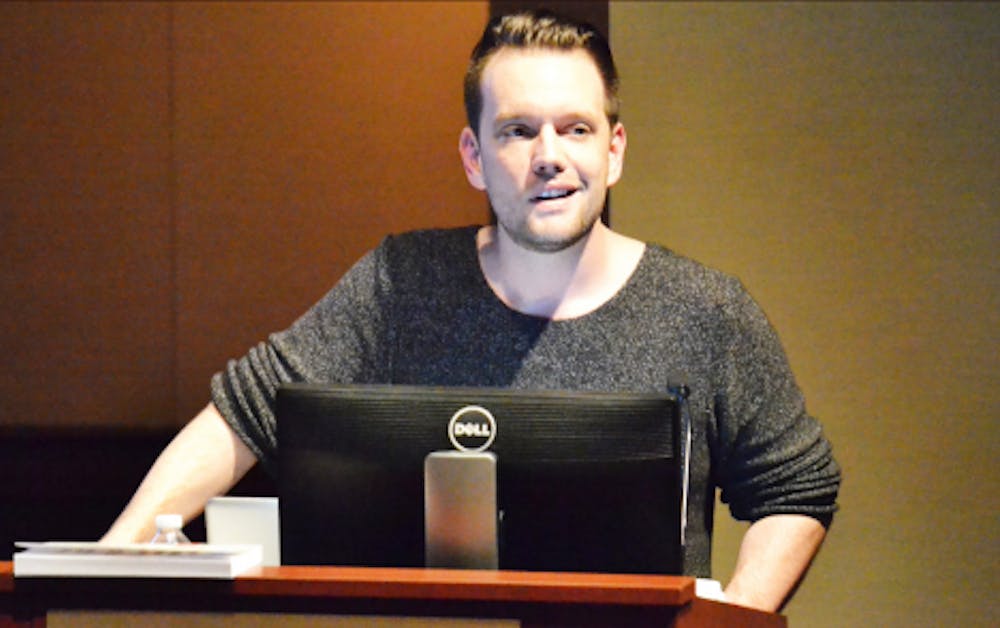By Shannon Kelly
Correspondent
We are all made up of stories. No matter what they are, some of our stories contain more conflict than one hero should have to face on their journey. The stresses of college can pile on and, at times, it may seem overwhelming.
Author Josh Rivedal, through his lecture entitled “The i’Mpossible Project: How to Live Mentally Well and Crush it in College,” continued the dialogue on mental health. He interspersed his talk with personal anecdotes, bringing his story to life by sharing it with students in the library auditorium on Thursday, Oct. 22.

Having battled depression and thoughts of suicide, Rivedal aims to engage others so that they don’t feel so alone. He spoke of the moment during a conversation when someone says, “No kidding, me too — so I’m not alone.” He wants people to feel that connection so that they can get the help they need.
“I need to help other people to feel whole again,” Rivedal said.
Sophomore English major Kristen Capano came to the lecture with the expectation of learning how to deal with some of the anxieties that come from being a college student. But she left with so much more.
Those dealing with mental illnesses, specifically depression, can move on from their past and create a happier life,” Capano said. “Josh is an example of that, and therefore, an inspiration. This encouraged me to keep fighting (through) my own mental health (struggles) and to help others do the same.”
That is what Rivedal hopes for. What he found worked best in his own life is for people to be mentors to one another.
“It’s about gift-giving, giving of yourself, giving a little extra,” he said.
Everyone can be called to be a mentor, as each story is unique and anyone can benefit from a simple conversation. It is important to be vocal about needing help, as that is the only way to get help, Rivedal said.
“I think my biggest takeaway from this talk was how important it is to be able to ask for and accept help when you need it,” said Kerry Graziano, a junior special education and English double major. “Josh’s talk reminded me that it’s OK to not be OK. Everyone is fighting unique battles and ultimately trying their best, and that’s what really matters.”
Talking it out with people is just one of the many tools that Rivedal includes in his “resiliency hand box,” which can be drawn upon in order to “be able to bounce and not break.”
Other tips include sleeping and eating well, being around positive people and setting up a system that works best for you. This may include laying out all your gym clothes to ensure you go for that run or repeating a personal mantra whenever things get stressful.
However, the most important tool, according to Rivedal, is reframing failure. Failure will happen in college, but changing the way we view it can greatly impact one’s overall attitude.
“We don’t talk about failure enough,” Rivedal said. “Failure is a lesson you learn on the way to success.”
Rivedal wants to hear about any failures or obstacles people have faced. He asked students to post selfies with the hashtag #iampossible and a caption describing their struggles.
His first collection of i’Mpossible stories from people struggling was a success and his second collection is set to be released in January 2017. However, he still needs more stories.
Students can submit 1,000 word stories of overcoming any obstacles throughout their lives for a chance of being published in Rivedal’s new collection in order to help inspire others.
Submissions can be sent to www.iampossibleproject.com/one.
“Storytelling is gonna be the thing that saves us,” Rivedal said.







